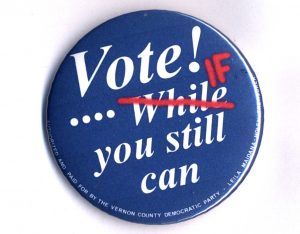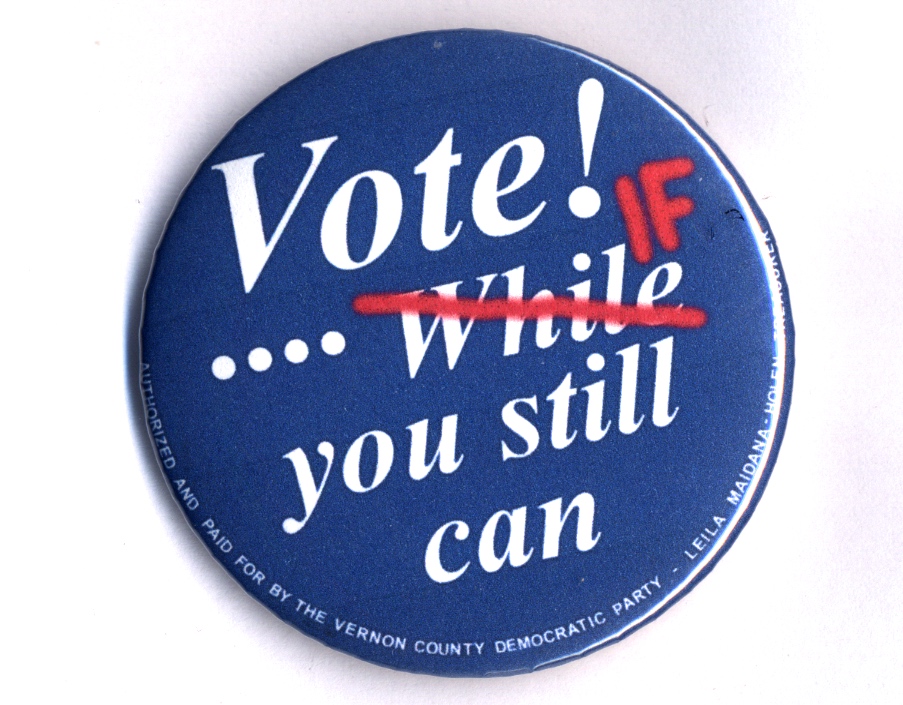
By Sam Levine
The HuffPost (7/9/18)
Civil rights groups in Michigan say they’ve collected enough signatures to allow voters in November to choose whether they want to amend the state constitution to include a series of measures designed to make it easier to vote there.
The potential constitutional amendment includes two elements that voting advocates say could significantly expand access to the ballot box: requiring the state’s motor vehicle agency to automatically register people when they get a driver’s license or personal ID card (people may opt out if they don’t want to register) and allowing people to register to vote on Election Day. Michigan currently requires people to register to vote at least 30 days before an election, the earliest it is allowed to do so under federal law.
The measure would also allow people to use straight ticket voting, allowing them to choose an entire party’s slate with a single notation. It would make explicit a right to cast a secret ballot and to have statewide elections audited. It would require that overseas and military voters receive ballots at least 45 days before an election — something advocates included after reports that some overseas voters weren’t getting their ballots with enough time to return them by the counting deadline.
The proposed amendment comes amid a heightened focus on voting rights in Michigan and elsewhere across the country. A separate ballot measure designed to limit excessive partisan redistricting has already qualified to go before voters in November. The measures represent an effort to significantly change voting laws in the state by going around the elected officials who are affected by who votes and who doesn’t. …
*****
With Midterms Approaching, The Recount Fight Continues For Elections We Can Trust
By Robert Blackmon
Voting Justice (7/8/18)
From the start, the 2016 Presidential recount was not simply a call to retabulate the vote. It was a demand for elections we can trust, that are accurate, secure and just, and free from the scourge of Jim Crow. While there’s been progress since then towards greater cybersecurity, our votes remain vulnerable to a spectrum of cyber threats. But that’s not all. On multiple fronts, our right to vote itself is under attack, along with other basic rights at the foundation of our democracy, including our rights of protest, privacy, freedom of the press and more. With democracy increasingly under fire, trustworthy elections are more critical than ever. For all these reasons, the recount fight continues as a battle for election protection and voting justice, a fight being waged in both the court of law and the court of public opinion.
The past year and a half has seen both mounting threats and important progress, including notable successes in ongoing recount-related efforts. This includes the adoption of crucial reforms the recount helped shine a spotlight on, and hard-fought legal progress towards much-needed scrutiny of secret, privately-controlled voting software.
The announcement of the recount just before Thanksgiving 2016 unleashed a torrent of support for bringing integrity to our elections. Donations poured in over the holiday weekend, reaching over 7 million dollars in just over a week from 161,000 donors contributing an average of 45 dollars each. Just as quickly, thousands of volunteers came forward to assist as observers for re-tallying the vote.
In each state, the recount asked the question: “Do we have elections we can trust, that are accurate, secure and just?” The answer was a resounding “No.”
The recount called for verifying the vote in three states with vulnerable voting machines and statistically unlikely results that begged for verification – including large deviations from exit polls and high numbers of ballots with blank presidential lines. While democracies around the world use recounts as a routine safeguard, the US recounts were fought tooth and nail by the Republican establishment and largely ignored by Democratic leadership.
Denial of recount in Wisconsin
In each state, the recount asked the question: “Do we have elections we can trust, that are accurate, secure and just?” The answer was a resounding “No.” In Michigan, political operatives leaned on partisan judges to stop the recount. In Pennsylvania, thousands of voters calling for a recount were thwarted by a bureaucratic nightmare of vague, obstructive rules requiring at least three voters in each of 9,000+ precincts to file notarized requests by undefined deadlines at unknown locations. And all this had to happen within mere days following the election. In Wisconsin, under-resourced communities of color – at highest risk for voting machine dysfunction – were denied a reliable hand recount, having their votes recounted instead by the very machines whose accuracy was in doubt. This adds to the burden of widely recognized forms of voter suppression targeting communities of color, including voter ID laws.
To remedy these ongoing problems, we continue to fight key legal battles that began early in the recount. In Wisconsin, we are in a protracted legal battle to examine a critical piece of voting software that controls the actual counting and tallying of votes, referred to as “source code.” Incredibly, despite years of warnings from experts about the vulnerability of voting machines, there has never been an in-depth examination of voting machine source code after an election. This examination, conducted by computer voting experts, would check for evidence of human error, intentional interference or tampering – whether by foreign powers, criminal networks, domestic partisans, or corporations that control the voting software.
Given the evidence of cyberattacks on multiple components of the voting system in 2016 – from voter registration files to private software companies – as well as the hacking that has become commonplace in virtually all sectors of society – from Equifax to the WannaCry attacks – the need for crosschecking the cybersecurity of our elections is paramount.
Corporate shield
While the Wisconsin Elections Commission has acknowledged our legal right to examine voting software, the voting machine corporations are trying to prevent us from sharing any findings with the public. So as our computer experts prepare to get down to work, we are continuing the legal battle to ensure that we will not be gagged in reporting any important findings. The effort of the private voting software companies to shield this critical component of our elections from scrutiny underscores the need to put the infrastructure of our elections back into the public domain.
After the recount was thwarted in Pennsylvania, we brought litigation against the state for effectively violating its citizens’ Constitutional right to vote through a double whammy of dubious paperless voting machines and recount procedures that prevent verification of these uncertain votes. The suit also calls for an extensive ”forensic” examination of voting equipment and software in order to verify the accuracy of the vote.
On another legal front altogether, we’ve also had to defend the recount from false accusations surrounding the Russian interference investigations. …

